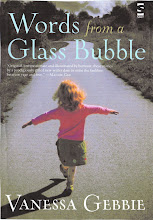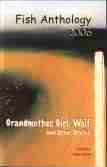This is the short story I wrote yesterday on the back of a fag packet, kind of, in the courtyard of the Royal Academy. I needed to convince myself, that no matter who nicks my creations, there are always and always more where that came from.
A Flying Fish Tale
It is a little-known fact, but fact it is, that far away in a country we now call Japan - and so many years ago that we do not have a number small enough to record the year – all the fishermen were poets and tellers of stories. Indeed, yes. They worked in all weathers on boats made of little else but paper, layer upon layer, glued together with the spittle of birds. And these boats were as light and as fast as the flying fish they sought.
Every day, with the exception of the annual celebrations commemorating the appearance of the first hair on the chin of the young Emperor, the villages and towns were supplied with copious amounts of flying fish.
Eating flying fish was thought to impart great power. It was believed, not without reason, that flying fish were the souls of drowned warriors killed in ancient battles with invaders who breached the horizon in sail-less boats made from the still-growing canes of green bamboo. To eat the fish not only imparted great strength and the sharpest wits, but if enough was consumed the eater was accorded the privilege of being able to commune with his ancestors.
But I digress.
The makers of poems and stories could no more make their words on land than fly. To stand on an earth that was unmoving, surrounded by mountains that merely stared back even when decked with snow or plum blossom, was a poor substitute for the sea. (Indeed, the old word for ‘a poor substitute’ is almost exactly the same as that for ‘earth’.) No- they needed the wind in their faces and on their chests- the skin nearest their minds and their hearts.
Their words came as they fished. The lightest words they made into sailcloth. The strongest words they wove into nets. And the heaviest words, the ones that came the hardest, from somewhere deep within their souls, they fashioned these into anchors and anchor chains.
Every boat fished its own apportioned section of the sea and never trespassed into the fishing ground of its neighbour. The seabed is never flat but mirrors the earth, and the anchor chains of each boat were made with an exact and secret number of links allowing the fishermen to drop anchor exactly in the right place. Their paper boats would be held secure with just enough play to rise and fall on the waves, whilst the fishermen spread their nets in a fine mist in the air, catching the fish as they flew by.
In this way, for countless centuries - a greater number than has yet been invented - the poets and storyteller fishermen nourished the country we now call Japan.
Their lightest words billowed and carried them through the most treacherous winds. Their strongest words caught flying fish in numbers not recordable. And their heaviest words, the ones that were hardest to make, tethered them to their chosen fishing grounds, holding their paper boats steady and safe until it was time to weigh anchor and head for home.
All was well. Until late one day, as darkness fell, in the week before the celebration of the first hair on the young emperor’s chin, under the cover of darkness, a boat made of the still-growing canes of green bamboo steered by a single oar, approached the sleeping fleet.
The lone sailor was a small man who wanted to become a fisherman. He wanted to catch his own flying fish and eat more than he could afford to buy at the market, rendering himself able to speak to his ancestors. But did not want to spend the years it took to make enough of his own words to weave sailcloth, make nets and forge heavy anchors and chains.
The bamboo boat floated between the sleeping fishing boats, and the small man looked round very carefully until he found the things he wanted. He climbed quietly onto one boat, and took the sails. He took the nets from another, and the anchor and chain from a third, then, on the tide, he floated out of the harbour and out to sea. Once in the open water, he secured the sails to a spar, and the wind filled them. The bamboo boat was carried many miles out into the ocean, past the fishing grounds, and on, towards the horizon. And when he was out of sight of the land and its few lights, he prepared to catch flying fish.
He trimmed the sails and set up the nets, raising them into the air on thin willow whips. And he waited. He did not have to wait long. Soon, flying fish flew into the nets in their dozens, and the small man rejoiced, and began singing to the fish.
But the weight of the fish caused the boat to drift… it began to circle lazily, and the next shoal of fish flew straight past. To catch more, the boat needed to be secured, to stay in one place.
The small man stopped in his singing and tied the end of the anchor chain to the boat with thick ropes. And he heaved the anchor over. The anchor fell down through the water, the chain curling down, down and down, deeper and darker, while the man watched and waited for the boat to stop drifting.
But the sea was deeper than the length of the chain. The anchor stopped dead in its fall through the water, and the bamboo boat began to tip, pulled down slowly but surely by its great weight. And with no one to watch save a few flying fish who were glad to be returned to the sea, the bamboo boat and all it contained, including the small man, was drawn beneath the water, down and down, until the anchor made from the heaviest words of others tethered it finally, deep in a crevasse. Where both it and he remain to this day.
It is said in those parts, that when the wind drops, and when the sea is calm, if you listen carefully - you can hear the last song of the would-be fisherman, singing still, a sad high song to the flying fish he caught just the once, trying to persuade them to let him speak.
Tuesday, 26 May 2009
Subscribe to:
Post Comments (Atom)




.JPG)























17 comments:
Well said. Beautifully said.
Ta. Flying fish n chips, anyone?
Now. Back to the business of forgetting this last week's rubbishy bits...
Wow, V, that is very different, hardly you!
Hi Vanessa
Now that I've discovered your excellent weblog I'll be clicking in on a regular basis. Loved the flying fish story, composed with such beautiful expression. Biblical in its poetry. A parable - yes that's it - it's a parable. I think I recognise the underlayered message. Great stuff! Bravo! More. More.
Brian (Lister)
Oh, oh, oh, yes! Wonderful! xo
wow, what a beautiful fable with a wonderful gruesome end.
Zilch for dialogue, heavy-handed on theme, prose aping Kipling... what what? Author intrusion everywhere, ending a great relief. I know...heard it all before!
(thanks for reading..)
Hello Brian - thank you for reading, and I am v pleased the undercurrents come through!
I am delighted to welcome you to my humble abloge. (Or 'abode', or just 'blog' but it is such an ugly word and the world needs nicer ones.)
V
Hi Annie, Hi Sue,
Thanks! Amazing what happens after an exhibition...and the sort of week Ive had!
A beautiful, poetic story, V.
That must have been a big, big fag packet.
David! Hello!
Ta, cobber. Oh yeah, VAST fag packet. I pull it along behind me on wheels.
I did used to smoke 2 packets a day. yuk. Gave up 30 years ago.
I used to be TINY, with a voice like an old gravel pit.
Wonderful. But sad.
Hi Sarah
thanks for reading! Aye, tis sad...
I love you story. Just wait while I cut and paste it to my own blog :p
Hi Niki
How lovely to see you here. I am glad you enjoyed the story! It is here to catch burglars.
I am watching from now on for stories written by magpies; with anchors made of words, anniversaries of the first hair on the chins of young emperors, boats made of green still-growing bamboo and last but not least, the restorative properties of flying fish.
A beautiful story with layers of meaning and a very appropriate ending.
Thanks for reading, Debi. Glad you liked it.
Post a Comment